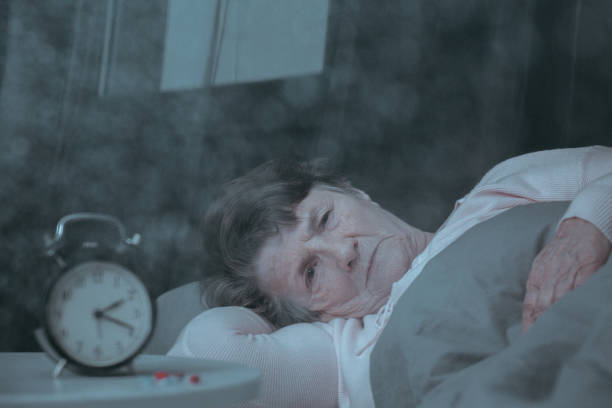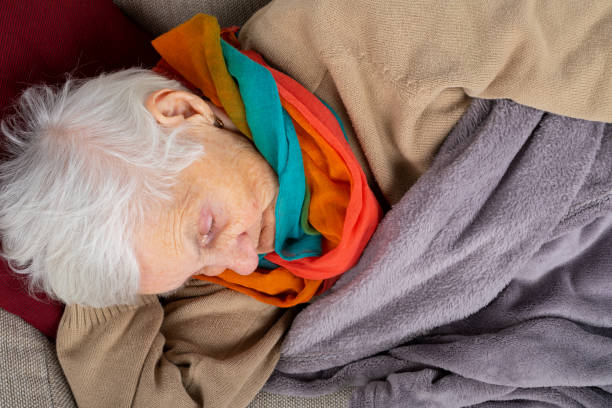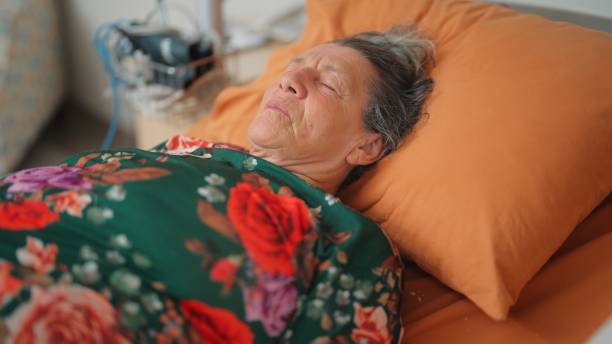Introduction

The life of a Parkinson's disease patient and their caregiver is often filled with many challenges. One major issue that can be difficult to manage is nighttime problems such as difficulty sleeping, restlessness, agitation, confusion, or vivid dreams. These symptoms can be emotionally draining for both the patient and their caregiver.
In this blog post, we will discuss coping strategies to help manage the emotional toll of nighttime problems in Parkinson's disease patients and caregivers. We'll look at how to recognize the signs of stress, develop a management plan, and find support from other sources. With these tools, you can better cope with the emotional burden of nighttime issues in Parkinson's disease patients and caregivers.
Definition of Parkinson's Disease
Parkinson's disease is an advancing neurodegenerative ailment that impairs motor functions. Manifestations may comprise tremors, rigidity, motor impairments, equilibrium challenges, and dysarthria or dysphagia. It predominantly afflicts individuals beyond the age of 60. As the disorder advances, patients may encounter escalated nocturnal symptoms like restiveness, cognitive disarray, emotional agitation, and perceptual distortions, which can engender sleep disturbances and significantly compromise overall well-being.
Overview of nighttime problems associated with Parkinson's disease

Parkinson's disease (PD) is an inevitable neurologic ailment that affects motor faculties, equilibrium, and harmonized movements. As the condition advances, nocturnal challenges burgeon, causing mounting concerns for caregivers and patients. These encompass an array of sleep disruptions, such as initial sleep onset hurdles, fragmented sleep patterns, premature awakening at dawn, and an abiding sense of unrevitalized slumber.
Nocturnal motor symptoms such as dyskinesia, tremor, or rigidity can also disrupt sleep and make it difficult to get enough restful sleep. Additionally, depression, anxiety, and pain can all interfere with a patient's ability to achieve quality sleep.
For caregivers of those living with PD, the effects of nighttime issues are often even more profound. Caregivers may experience heightened levels of stress and exhaustion due to managing the patient's nighttime symptoms in addition to their own. They may be emotionally and physically spent, leading to decreased quality of life.
Common symptoms and challenges faced by patients due to nighttime problems
There are many common symptoms and challenges faced by Parkinson's disease patients due to nighttime problems. These can include difficulty falling or staying asleep, early morning awakenings, frequent night-time wakeups, restlessness during sleep, vivid dreams and nightmares that can be distressing, and sleep apnea. These issues may cause daytime fatigue and disrupted sleep patterns, significantly affecting the quality of life.
From the patient's perspective, there may be frustration, sadness, and anger due to insufficient sleep. For caregivers, lack of sleep caring for a loved one with Parkinson's Disease at nightcap takes an emotional toll. All those affected must find ways to cope with the emotions that come up due to nighttime problems.
Effect of Emotional toll caused by the condition
It is well known that the emotional toll of nighttime problems can be particularly arduous for caregivers and patients with Parkinson's Disease.
Here are a few astute suggestions to alleviate the emotional repercussions entwined with this debilitative malady:
-
Please educate yourself on the subject: Find reliable information about Parkinson's disease and its effects on sleep, such as sleep disruptions, nocturia (frequent nighttime urination), and restlessness. Acquiring profound insight into the intricacies of this affliction can effectively mitigate the emotional weight of assuming the caregiving role for a cherished individual grappling with Parkinson's disease.
-
Develop a plan: Speak to your healthcare providers to devise a well-suited individualized plan for you and your family member. Through collaboration, you can establish a nocturnal regimen that helps guarantee adequate repose and other interventions to rectify nighttime difficulties.
-
Find support: Connect with other families who have been similarly afflicted by Parkinson's Disease or become a part of a local support group to garner advice. Many caregivers find it beneficial to communicate their narratives and glean insights from others in similar circumstances.
-
Seek help from professionals: For those providing care for a beloved family member with Parkinson's disease, the emotional weight can be overwhelming. Consulting with a mental health specialist is recommended to devise an approach that optimizes the management of this burden. Counselors and therapists are available to provide strategies that alleviate stress and promote improved coping methods.
How can I help my Parkinson's patient sleep at night?

Parkinson's disease (PD) can cause nighttime problems that can emotionally affect the patient and their caregiver. Fortunately, some strategies can help ease these issues, allowing patients and caregivers to get better sleep. Here are some tips:
1. Establish a consistent bedtime routine. Establishing a regular sleep cycle can be facilitated by going to bed and arising at the same time each day.
2. Exercise regularly. Engaging in physical activity during the day has been demonstrated to benefit sleep quality and wakefulness throughout the night. It is crucial to emphasize that consistently engaging in exercise helps to augment muscle strength, balance, and agility and can also catalyze dopamine production, thus promoting enhanced rest quality.
3. Keep the bedroom cool, dark, and quiet. Creating a peaceful environment that promotes relaxation can be beneficial for a good night's sleep.
4. Stick to naps rather than sleeping in through the day. Napping during the day can help reduce nighttime restlessness and make it easier to fall asleep when it is time for bed.
5. Abstain from consuming caffeine and abstain from exposure to bright lights before bedtime. Caffeine can impede the ability to fall asleep and may keep one up, while glaring lighting can disturb sleep cycles.
6. Take medications for nighttime restlessness. Medications such as melatonin can help reduce nighttime waking and improve sleep quality.
7. Talk to your doctor about other medications that could be beneficial. Certain medications can help with Parkinson's-related nighttime symptoms, such as reducing sleep fragmentation and improving daytime concentration.
8. Consider cognitive behavioral therapy. Cognitive behavioral therapy (CBT) has been shown to help with insomnia by teaching patients better sleep hygiene habits and changing negative thoughts about sleep.
9. Take care of yourself too! As a caregiver, it's also important to care for yourself – get enough sleep and practice self-care.
Explore the emotional and psychological effects experienced by Parkinson's disease patients.
Parkinson's disease (PD) is a degenerative neurological ailment that impairs mobility and can have far-reaching psychological and emotional repercussions. The nighttime can be especially challenging for people with PD, as they may experience greater physical fatigue, difficulty sleeping, and increased pain. In addition to these physical symptoms, the nighttime presents unique emotional challenges for PD patients and their caregivers.
For Parkinson's disease patients, the emotional toll of nighttime problems can be overwhelming. Fear and anxiety related to nocturnal symptoms can lead to feelings of isolation and loneliness. Sleep disturbances can also augment depression in people with Parkinson's, as they may feel more enervated during the day and have difficulty focusing or accomplishing tasks.
For caregivers, nighttime problems can also be a source of stress and anxiety. Caregivers may experience feelings of guilt or helplessness as they cannot provide their loved one with the necessary care. They may also worry about how their loved one copes with the emotional strain accompanying nightly disturbances.
Fortunately, there are strategies caregivers, and PD patients can use to cope with the emotional toll of nighttime problems. Self-care is an integral part of mitigating stress, apprehension, and depression. This involves physical exertion, therapeutic techniques, and obtaining sufficient slumber.
How does caregiving impact their mental and emotional well-being?
Caregivers and individuals affected by Parkinson's disease often grapple with nighttime issues, ranging from sleep disturbances to abnormal movements. These disruptions can prove emotionally taxing for both parties and may be difficult to manage. This article will explore how nighttime issues related to Parkinson's disease can impact patients and their caregivers' mental and emotional well-being.
Impact on the Patient
At its most basic, nighttime problems in Parkinson's disease can lead to sleep disturbances that leave patients exhausted during the day. But they may also experience abnormal movements like dystonia, akinesia, and bradykinesia during the night. These can cause significant discomfort, pain, and frustration for patients – all of which can contribute to a decline in their mental and emotional well-being.
Impact on Caregivers
In addition to sleep disturbances and erratic movements, nocturnal issues can be a source of tremendous stress for caregivers. They may experience intense feelings of helplessness in light of the anguish their beloved is enduring or harbor fears that they are not doing enough to offer assistance. These sentiments may lead to guilt, apprehension, and disorder, all of which intensely influence their overall psychological and emotional health.
When is it necessary to seek professional help for nighttime problems?
Nighttime problems in Parkinson's Disease patients can be frustrating and taxing for both the patient and their caregivers. If these issues become unmanageable, it may be necessary to seek professional help. Symptoms such as insomnia, sleep disturbances, depression, anxiety, fatigue, and cognitive impairment may indicate a need for medical or psychological intervention.
If nighttime difficulties start to impede daily operations or detrimentally influence interpersonal relationships, it is essential to solicit specialist advice promptly. A medical professional can proffer counsel on dealing with these concerns and refer one to a specialist if needed.
FAQ's
Why do Parkinson's patients not sleep well at night?
Parkinson's disease (PD) can cause various nighttime problems, including difficulty falling or staying asleep, restlessness during sleep, vivid dreams and nightmares that can be distressing, and sleep apnea. Additionally, symptoms such as depression, anxiety, and pain can all interfere with a patient's ability to achieve quality sleep.
What is the best sleeping position for Parkinson's disease?
The best sleeping position for Parkinson's disease will vary from person to person. Some people may find that using a reclining chair or an adjustable bed that can be raised at the head and bent at the knees helps them sleep more comfortably. Some individuals may find it more comfortable to sleep on their side with a cushion between their legs or lie supine with their lower limbs raised. It's best to experiment with different positions to find the most comfortable.
What sleeping pill is safe for Parkinson's?
Obtaining medical counsel before consuming any soporific substances is critical, as certain formulations may detrimentally influence the efficiency of PD medications. For Parkinson's disease sufferers, some secure alternatives comprise melatonin, trazodone, and doxepin. These medicaments enhance sleep quality and reduce nocturnal awakenings.
What foods are high in dopamine for Parkinson's disease?
Dopamine is a neurotransmitter that regulates motor functions and emotional states. Leafy greens, fish, poultry, nuts & seeds, beans, coffee & tea, apples, and bananas are rich in dopamine. Additionally, supplements such as Vitamin B6 can enhance the amount of dopamine present.
How can I help my Parkinson's patient sleep at night?
It is possible to alleviate the nighttime issues experienced by those suffering from Parkinson's disease by implementing a few strategies. Establishing a regular sleep schedule, engaging in physical exertion daily, ensuring the bedroom remains dim and serene, abstaining from stimulants such as caffeine close to bedtime, taking medication to combat restlessness, and contemplating cognitive-behavioral treatments are some measures that can be taken. Caregivers must also take care to ensure they acquire sufficient rest themselves.
Conclusion
I hope this blog post has helped provide an overview of the emotional toll of nighttime problems on Parkinson's Disease patients and caregivers. The key takeaway is to recognize the signs of stress, develop a management plan, and find support from other sources. With these tools, you can better cope with the emotional burden of nighttime issues in Parkinson's disease patients and caregivers.

